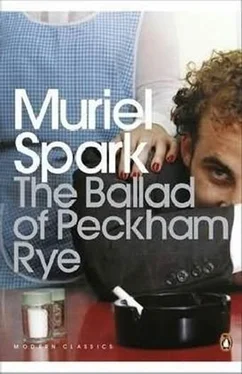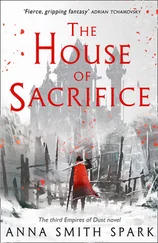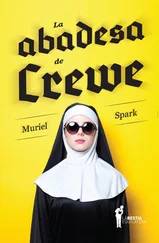Muriel Spark - The Ballad of Peckham Rye
Здесь есть возможность читать онлайн «Muriel Spark - The Ballad of Peckham Rye» весь текст электронной книги совершенно бесплатно (целиком полную версию без сокращений). В некоторых случаях можно слушать аудио, скачать через торрент в формате fb2 и присутствует краткое содержание. Жанр: Современная проза, на английском языке. Описание произведения, (предисловие) а так же отзывы посетителей доступны на портале библиотеки ЛибКат.
- Название:The Ballad of Peckham Rye
- Автор:
- Жанр:
- Год:неизвестен
- ISBN:нет данных
- Рейтинг книги:3 / 5. Голосов: 1
-
Избранное:Добавить в избранное
- Отзывы:
-
Ваша оценка:
- 60
- 1
- 2
- 3
- 4
- 5
The Ballad of Peckham Rye: краткое содержание, описание и аннотация
Предлагаем к чтению аннотацию, описание, краткое содержание или предисловие (зависит от того, что написал сам автор книги «The Ballad of Peckham Rye»). Если вы не нашли необходимую информацию о книге — напишите в комментариях, мы постараемся отыскать её.
The Ballad of Peckham Rye — читать онлайн бесплатно полную книгу (весь текст) целиком
Ниже представлен текст книги, разбитый по страницам. Система сохранения места последней прочитанной страницы, позволяет с удобством читать онлайн бесплатно книгу «The Ballad of Peckham Rye», без необходимости каждый раз заново искать на чём Вы остановились. Поставьте закладку, и сможете в любой момент перейти на страницу, на которой закончили чтение.
Интервал:
Закладка:
‘No necessity,’ Beauty said as she put away her comb and patted her handbag.
‘We might enjoy ourselves,’ Humphrey said.
Dixie got her things together rather excitedly. But she said, ‘Oh, it isn’t my idea of a night out.’
And so they followed Dougal and Beauty up Rye Lane to the Harbinger. Beauty was half-way through the door of the saloon bar, but Dougal had stopped to look into the darkness of the Rye beyond the swimming baths, from which came the sound of a drunken woman approaching; and yet as it came nearer, it turned out not to be a drunken woman, but Nelly proclaiming.
Humphrey and Dixie had reached the pub door. ‘It’s only Nelly,’ Humphrey said, and he pushed Dougal towards the doorway in which Beauty was waiting.
‘I like listening to Nelly,’ Dougal said, ‘for my human research.’
‘Oh, get inside for goodness’ sake,’ Dixie said as Nelly appeared in the street light.
‘Six things,’ Nelly declaimed, ‘there are which the Lord hateth, and the seventh his soul detesteth. Haughty eyes. a lying tongue, hands that shed innocent blood. See me in the morning. A heart that deviseth wicked plots, feet that are swift to run into mischief. Ten at Paley’s yard. A deceitful witness that uttereth lies. Meeting-house Lane. And him that soweth discord among brethren.’
‘Nelly’s had a few,’ Humphrey said as they pushed into the bar. ‘She’s a bit shaky on the pins tonight.’
A bright spiky chandelier and a row of glittering crystal lamps set against a mirror behind the bar – though in fact these had been installed since the war – were designed to preserve in theory the pub’s vintage fame in the old Camberwell Palace days. The chief barmaid had a tiny nose and a big chin; she was a middle-aged woman of twenty-five. The barman was small and lithe. He kept swinging to and fro on the balls of his feet.
Beauty wanted a Martini. Dixie, at first under the impression that Humphrey was buying the round, asked for a ginger ale, but when she perceived that Dougal was to pay for the drinks, she said, ‘Gin and ginger ale.’ Humphrey and Dougal carried to a table the girls’ drinks and their own half-pints of mild which glittered in knobbly-moulded glass mugs like versions of the chandelier. Round the wall were hung signed photographs of old-time variety actors with such names, meaningless to most but oddly suggestive, as Flora Finch and Ford Sterling, who were generally assumed to be Edwardian stars. An upright piano placed flat against a wall caused Tony the pianist to see little of the life of the house, except when he turned round for a rest between numbers. Tony’s face was not merely pale, but quite bloodless. He wore a navy-blue coat over a very white shirt, the shirt buttoned up to the neck with no tie. His half-pint mug, constantly replenished by the customers, stood on an invariable spot on the right-hand side of the piano-top. As he played, he swung his shoulders from side to side and bent over the piano occasionally to stress his notes. He might, from this back view, have been in an enthusiastic mood, but when he turned round it was obvious he was not. It was Tony’s lot to play tunes of the nineteen-tens and -twenties, to the accompaniment of slightly jeering comments from the customers, and as he stooped over to execute ‘Charmain’, Beauty said to him, ‘Groove in, Tony.’ He ignored this as he had ignored all remarks for the past nineteen months. ‘Go, man, go,’ someone suggested. ‘Leave him alone,’ the barmaid said. ‘You just show up your ignorance. He’s a beautiful player. It’s period stuff. He got to play it like that.’ Tony finished his number, took down his beer and turned his melancholy front to the company.
‘Got any rock and cha-cha on your list, Tony?’
‘Rev up to it, son. Groove in.’
Tony turned, replaced his beer on the top of the piano, and rippled his hands over ‘Ramona’.
‘Go, man, go.’
‘Any more of that,’ said the barmaid, ‘and you go man go outside.’
‘Yes, that’s what I say. Tony’s the pops.’
‘Here’s a pint, Tony. Cheer up, son, it may never happen.’
At ten past nine Trevor Lomas entered the pub followed by Collie Gould. Trevor edged in to the bar and stood with his back to it, leaning on an elbow and surveying as it were the passing scene.
‘Hallo, Trevor,’ Dixie said.
‘Hi, Dixie,’ Trevor replied severely.
‘Hi,’ Collie Gould said.
Beauty, who was on her fourth Martini, bowed graciously, and had some difficulty in regaining her upright posture.
The barmaid said, ‘Are you ordering, sir?’
Trevor said over his shoulder, ‘Two pints bitter.’ He lit a cigarette and blew out the smoke very very slowly.
‘Trev,’ Collie said in a low voice, ‘Trev, don’t muck it up.
‘I’m being patient,’ Trevor said through half-dosed lips. ‘I’m being very very patient. But if -‘
‘Trev,’ Collie said, ‘Trev, think of the lolly. Them notebooks.’
Trevor threw half a crown backwards on to the counter.
‘Manners,’ the barmaid said as she rang the till. She banged his change on the counter, where Trevor let it lie.
Dougal and Humphrey approached the bar with four empty glasses. ‘Ginger ale only,’ Dixie called after them, since it was Humphrey’s turn.
‘One Martini. Two half milds. One gin and ginger ale,’ Humphrey said to the barman. And he invited Trevor to join them by pointing to their table with his ear.
Trevor did not move. Collie was watching Trevor.
Dougal got out some money.
‘My turn,’ Humphrey said, fishing out his money.
Dougal picked half a crown from his money and, leaning his back against the bar, tossed it over his shoulder to the counter. He then lit a cigarette and blew out the smoke very slowly, pulling his face to a grave length and batting his eyelashes.
Beauty shouted, ‘Doug, you’re a boy! Dig Doug! He’s got you. Trev. He does Trevor to a T.’ Tony was playing the ‘St Louis Blues’.
‘Trev,’ Collie said, ‘don’t, Trev, don’t.’
Trevor raised his sparkling pint glass and smashed the top on the edge of the counter. In his hand remained the bottom half with six spikes of glass sticking up from it. He lunged it forward at Dougal’s face. At the same swift moment Dougal leaned back, back, until the crown of his head touched the bar. The spikes of glass went full into one side of Humphrey’s face which had been turned in profile. Dougal bent and caught Trevor’s legs while another man pulled Trevor’s collar until presently he lay pinned by a number of hands to the floor. Humphrey was being attended by another number of hands, and was taken to the back premises, the barmaid holding to his face a large thick towel which was becoming redder and redder.
The barman shouted above the din, ‘Outside, all.’
Most of the people were leaving in any case lest they should be questioned. To those who lingered the barman shouted, ‘Outside, all, or I’ll call the police.’
Trevor found himself free to get to his feet and he left, followed by Collie and Beauty, who was seen to spit at Trevor before she clicked her way up Rye Lane.
Dixie remained behind with Dougal. She was saying to him, ‘It was meant for you. Dirty swine you were to duck.’
‘Outside or I call the police,’ the barman said, bouncing up and down on the balls of his feet.
‘We were with the chap that’s hurt,’ Dougal said, ‘and if we can’t collect him I’ll call the police.’
‘Follow me,’ said the barman.
Humphrey was holding his head over a bowl while cold water was being poured over his wounds by Tony, who seemed to take this as one of his boring evening duties.
‘Goodness, you look terrible,’ Dougal said. ‘It must be my fatal flaw, but I doubt if I can bear to look.’
Читать дальшеИнтервал:
Закладка:
Похожие книги на «The Ballad of Peckham Rye»
Представляем Вашему вниманию похожие книги на «The Ballad of Peckham Rye» списком для выбора. Мы отобрали схожую по названию и смыслу литературу в надежде предоставить читателям больше вариантов отыскать новые, интересные, ещё непрочитанные произведения.
Обсуждение, отзывы о книге «The Ballad of Peckham Rye» и просто собственные мнения читателей. Оставьте ваши комментарии, напишите, что Вы думаете о произведении, его смысле или главных героях. Укажите что конкретно понравилось, а что нет, и почему Вы так считаете.












